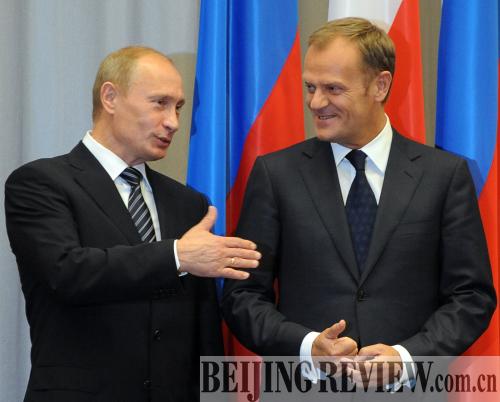|
 |
|
CORDIAL CHAT: Russian Prime Minister Vladimir Putin chats with his Polish counterpart Donald Tusk prior to a joint press conference after their meeting in Gdansk, Poland, on September 1 (XINHUA/AFP) |
U.S. President Barack Obama announced plans to scrap the controversial missile defense program in Eastern Europe on September 18. Russian President Dmitry Medvedev, not surprisingly, welcomed the decision. Following more than two years of stalemate, arguably the biggest cause of contention between Washington and Moscow may have finally come to an end.
Intense responses
The day before Obama's announcement, NATO Secretary General Anders Fogh Rasmussen voiced appreciation over the United States' decision to halt its missile defense system in Poland and the Czech Republic.
This move, he added, will help repair NATO's oft-strained relations with Moscow. Nonetheless, the Czechs and the Poles walked away feeling humiliated. They were, moreover, angered by the inconsistencies of the White House on this issue.
The response of these two former Soviet bloc nations is understandable. They have long depended on NATO to provide comprehensive security.
This explains why they turned to NATO and, in 2003, toward the United States by committing troops in the U.S.-led invasion of Iraq. Former U.S. Defense Secretary Donald Rumsfeld praised them as being part of the "new Europe."
Now, Obama takes a totally different approach—making them feel that the interests of East European countries are being neglected and harmed by the United States—while repairing relations with Moscow. Not surprisingly, suspicion and distrust flourish among the people of Central and Eastern Europe.
Indeed, since hostilities erupted between Georgia and Russia in August last year, East European countries, led by the Czech Republic and Poland, have been increasingly vigilant toward Russian activities.
Under these conditions, the United States announced its plans to scrap the missile defense shield in Eastern Europe, leaving some East European countries to regard the move as an appeasement to Russia. Within the United States, Obama also faces increasing domestic criticism. Many Americans consider the decision to be a concession to Moscow as well.
In fact, it is more of a strategic adjustment after the Obama administration recalibrated all the pros and cons of deploying a missile defense system in Europe.
It was after careful considerations that Obama decided to redeploy land-based missile interceptors to the sea. With this adjustment, the United States lost nothing, while gaining trust from Russia, allowing the possible imposition of new sanctions on Iran. The negotiations on a new agreement on cutting nuclear weapons between the United States and Russia, on the other hand, are also probable to head for big achievements by the end of this year.
Complex background
Since former U.S. President George W. Bush first declared his intention to deploy a missile defense system in the Czech Republic and Poland in January 2007, Washington and Moscow have often been at loggerheads. The United States said it would deploy the system only to defend against missile threats from Iran.
Russia, on the other hand, regarded it as a threat and strenuously objected. If the United States insisted on the missile defense shield in Eastern Europe, Russia said it would respond by deploying missiles in Kaliningrad, Russia's enclave adjacent to NATO's new member states, Lithuania and Poland.
Compared with the former defensive strategy from 2000, when Vladimir Putin took power, until 2006, the current Russian Government presents a big change in its attitude toward the West. Russia, for one, will appear on the international stage as a world power with a more motivated and competitive gesture.
| 